Castle: The Podcast Player App With Transcripts. Does It Lower the Drawbridge?
Transcripts are a big deal for audiences and discovery, but they’re extra work for podcast producers. For independent podcast producers with limited time and money, transcripts are either a chore or an afterthought. Television has closed captioning, whether supplied by the channel or the device itself. YouTube has captioning, with varying amounts of accuracy. Podcasts have tried to catch up, and the burden falls on the podcast producer. Finally, Castle shows how a podcast player app can take responsibility for transcription. But how accurate is Castle’s transcription? And does it reach its goal?
Who Built Castle And Why?
This new podcast app was created by a self-described “mom and pop team,” Steve and Leigh, who wished they “could share that one part of that one conversation from that one podcast episode.”
“We have also talked about what it could be like if podcasts were searchable. You could type in part of the conversation you remember and be able to find which episode and where in that episode the conversation happened.” The motivation behind it is much like Podintelligence, but (thankfully) for once, the work doesn’t fall on the independent podcast producer.
If you search for “Castle” on a search engine or in an app store, you’ll find loads of games that emphasize building or swinging battle axes or casting spells, so make sure you search for “Castle the podcast player.”
Is Castle’s Transcription Feature Any Good?
Artificial intelligence powers Castle’s transcription engine. Users can generate a transcript for a new episode right away. Once generated, it’s available for all Castle users playing that episode, not only the user who generated it. I tried it with a few different podcast episodes to test its speed and accuracy.
I tested the app with four different podcasts that vary by voice, dialect, language, and speech impediments. These podcasts all vary by length, bitrate, multi-layered sound, and dynamic content. All of these can affect download efficiency, so let’s see how it worked out.
How Fast Is Castle’s Transcription?
Castle says that “this process usually takes about 10 minutes.” It depends on the episode’s length. That being said, each transcript generated more quickly than I expected. An episode of Pocket-Sized Podcasting took less than a minute to transcribe. The transcript will scroll along with the audio while in playback mode. Again, once the transcript is complete, it remains with the app so that others who want to consume the same podcast episode can use that transcript as well. After more Castle users have generated transcripts, time may no longer be an issue, especially for podcasts with many followers.
How Accurate Is Castle’s Transcription?
As Italian-Americans say, mezza mezza.
Castle’s sole caution message says that dynamic content can affect accuracy.
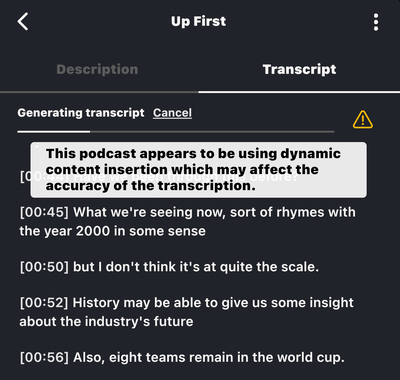
Castle’s transcription software was fairly accurate with Up First from NPR.
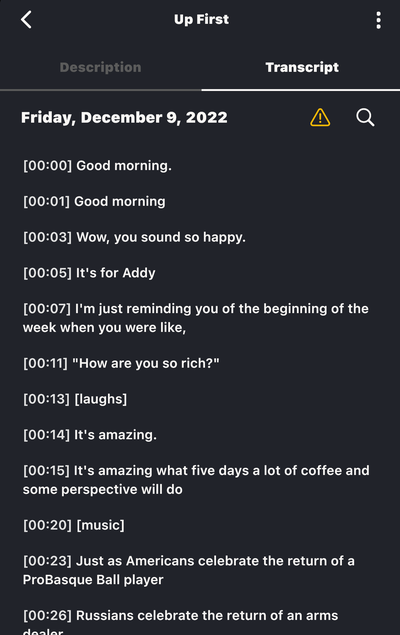
The transcription software substitutes “for Addy” for “Friday,” “rich” for “awake,” and “ProBasque Ball” for “pro basketball.” Most readers can use context clues to understand the intention, though it’s not perfect.
The transcription was vaguer with The White Vault, which has a variety of dialects and languages; British English, German, Norwegian and Mexican Spanish.
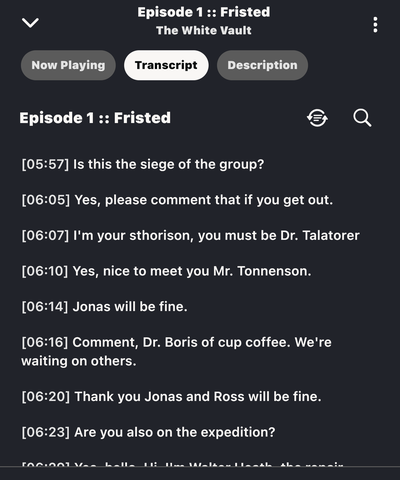
The least accuracy was when native English speakers ran words together or used words that aren’t traditional English words. For example, “you end up” became “Yendop,” and “Alitu” came out as “Alotube.” Again, this transcription isn’t a substitute for listening, but it aids sharing.
Other Than That, How’s the App?
Castle the podcast player reminds me of Overcast in its simplicity.
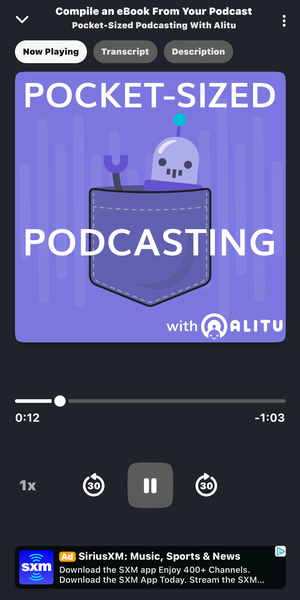
The directory has no categories. The app displays 60 “trending podcasts” and lets you search by podcast title, or by entering the RSS feed URL. To enter an RSS feed, Castle asks for the podcast URL, and for some people, it might not be clear enough that they mean “RSS feed.”
Users can customize their own playlists by selecting which podcast to include, and it updates itself as episodes publish. The order options are “newest to oldest” or “oldest to newest.” Creating a custom order or selecting by episode isn’t available.
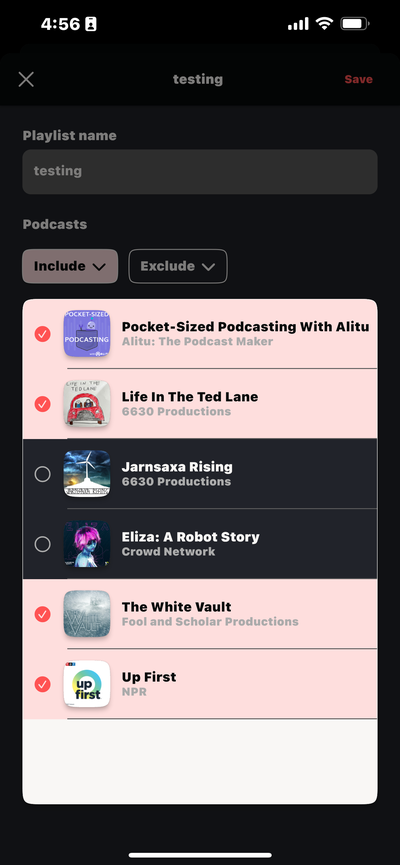
Castle’s creators emphasized the shareability of text. You can select and copy text directly from the transcript into a note-taking app or an email, for example. Castle’s share feature shares a link to the mp3 file itself.
Playback settings include speed and customizing skip intervals (between 5 and 90 seconds.) There is a toggle switch to make these settings stay for this podcast, or users can leave it alone to keep those settings until they change it.
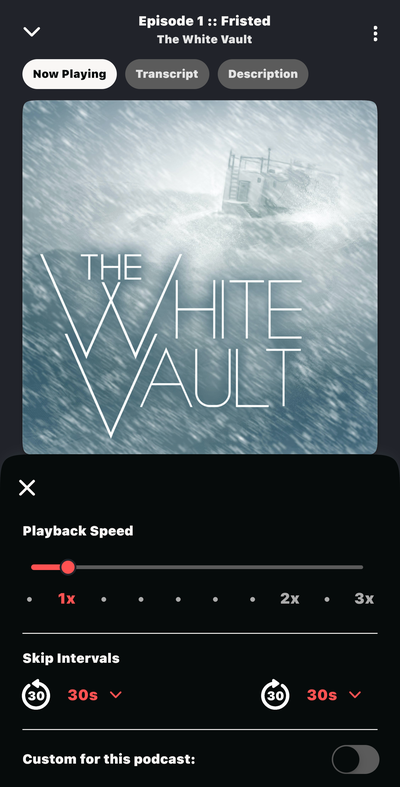
One banner Google ad at the bottom of the screen reminds you that this free app isn’t free to make.
Castle is a really straightforward podcast player. If you’re already comfortable with searching for podcasts that you want to hear, and need transcripts to aid listening (rather than replace it), it does the job.
What Does Castle’s Transcription Mean for the Average Podcaster?
Transcripts shouldn’t have to be an issue in podcasting. But they’re treated like a game of hot potato, usually landing in the producer’s lap. It’s often assumed that only people who are hearing impaired need a text-based version of content. Castle the podcast player solves this and more.
Who Needs Transcripts?
“With no regulations directly requiring access to podcasts, accessibility rests on the awareness and willingness of podcast producers,” says Bryan Gould, Director of Accessible Learning and Assessment Technologies at the Carl and Ruth Shapiro Family National Center for Accessible Media at WGBH (NCAM). “So, like TV and movie captions, it’s worth exploring different podcast platforms to see which, if any, are captioned or provide a transcript. If there is no access, advocate.”
What Can Transcripts Do?
This leaves out all the other things a transcript can do for a podcast, such as aiding understanding, or making it easier to share and promote its ideas. Good show notes can link to visual art, maps, recipes, or other resources to provide context. And, of course, they can link to affiliate marketing offers or a sponsor‘s site. Transcripts can do the same.
Who Should Be Responsible For Transcripts?
Large platforms with listening apps, such as Apple or Spotify, may have the resources to provide transcripts. Whether this is true or not, it hasn’t produced results yet. Media hosts offer transcripts as a feature, but it’s still the producer’s responsibility to make and use them. Media companies and well-funded podcast networks can afford to hire a staff to transcribe their episodes. Independent podcasters don’t have this option.
However, when podcasters rely on a third party for transcripts, they lose control and responsibility. We’ve all seen errors with autocorrect. What happens when an AI-generated transcript makes a podcast appear to spread misinformation or objectionable content? When podcasters take responsibility for their transcripts, they can ensure brand and message consistency.
In 2006, only about 22% of people knew what a podcast is. Sixteen years later, an estimated 177 million people listen to podcasts. How amazing is it that people love podcasts and want to share the content so much that they built a tool independent podcasters needed? If a “mom and pop shop” can develop Castle, the podcast player with transcripts, then media companies, podcast networks, and directory platforms can easily step up and help take the transcription workload.

